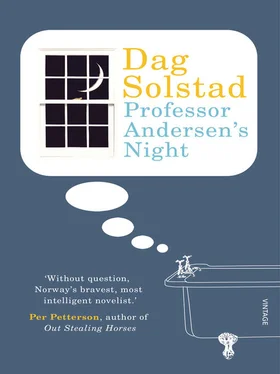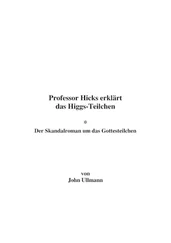Dag Solstad - Professor Andersen's Night
Здесь есть возможность читать онлайн «Dag Solstad - Professor Andersen's Night» весь текст электронной книги совершенно бесплатно (целиком полную версию без сокращений). В некоторых случаях можно слушать аудио, скачать через торрент в формате fb2 и присутствует краткое содержание. Год выпуска: 2011, Издательство: Harvill Secker, Жанр: Современная проза, на английском языке. Описание произведения, (предисловие) а так же отзывы посетителей доступны на портале библиотеки ЛибКат.
- Название:Professor Andersen's Night
- Автор:
- Издательство:Harvill Secker
- Жанр:
- Год:2011
- ISBN:нет данных
- Рейтинг книги:3 / 5. Голосов: 1
-
Избранное:Добавить в избранное
- Отзывы:
-
Ваша оценка:
- 60
- 1
- 2
- 3
- 4
- 5
Professor Andersen's Night: краткое содержание, описание и аннотация
Предлагаем к чтению аннотацию, описание, краткое содержание или предисловие (зависит от того, что написал сам автор книги «Professor Andersen's Night»). Если вы не нашли необходимую информацию о книге — напишите в комментариях, мы постараемся отыскать её.
Professor Andersen fails to report the crime. The days pass, and he becomes paralysed by indecision. Desperate for respite, the professor sets off to a local sushi bar, only to find himself face to face with the murderer.
Professor Andersen's Night
Professor Andersen's Night — читать онлайн бесплатно полную книгу (весь текст) целиком
Ниже представлен текст книги, разбитый по страницам. Система сохранения места последней прочитанной страницы, позволяет с удобством читать онлайн бесплатно книгу «Professor Andersen's Night», без необходимости каждый раз заново искать на чём Вы остановились. Поставьте закладку, и сможете в любой момент перейти на страницу, на которой закончили чтение.
Интервал:
Закладка:
Professor Andersen paced round his apartment, from early morning to late at night. At midday he usually lay down in bed and, as a rule, he then slept for a few hours, in a kind of doze. The same at night. He slept fitfully, his dreams reduced to muddled thoughts, milling around. Nevertheless, he felt alert as he wandered restlessly around the apartment, and he also passed the time by doing daily chores, such as making food, eating, washing up, vacuuming, tidying. Indeed, he even made the bed, although he knew that he was going to lie in it most of the day, and that he would lie down in it again in a few hours’ time, for a rest of sorts after dinner. He felt his mind was crystal clear, but despite that he was at his wits’ end. He couldn’t understand his reluctance to report Henrik Nordstrøm for the murder he had seen him commit. Well, yes, he understood that he hadn’t reported him when it had happened, but why he was unable to report him now, when he had experienced, bodily and mentally, the impossible consequences it held for him was more than he could fathom. His sin of omission couldn’t be defended. Every civilisation is built on such actions being indefensible. That goes without saying. In all circumstances. When he didn’t report it, he had become an outcast, along with the murderer. An outcast in his own eyes, along with the murderer. And he deserved this. And behind it all was God. As the ultimate reason why breaking this natural order was a taboo which no living person can explain, touch or wipe from their memory. Professor Andersen was not a religious man, he was fairly unfamiliar with thinking along those lines, but now he couldn’t stop himself blurting out, when he thought and thought about what he had become entangled in, and couldn’t get untangled from, even though he desperately wanted to, ‘No one can have their own God. Not even the godless.’ He was startled when that thought struck him. But he was forced to realise that it was self-evident, and that he had no alternative but to take heed of it.
The thought had emerged completely spontaneously, as a vision, which had burst its way through his broodings, as he paced around his apartment, in pyjamas, with a dressing gown on, right in the middle of the day. It was an inner voice which called out, and he felt both taken by surprise and uncomfortable. It wasn’t the first time he had been entangled in a train of thought that made him feel uncomfortable, and which he didn’t like. Ever since the murderer had entered his life, he had had a tendency to get hung up on impossible abstractions, ones which quite simply made him feel sick. For instance, having made up his mind, urgently and repeatedly, that Henrik Nordstrøm had commited a ‘primordial crime’, he could find himself staring intently at his watch in order to see, or feel, if there might be a connection between ‘primordial time’ in the sense of early origin, and ‘time’ as measured by the apparatus which ticks your own time and which is strapped around your wrist. It was, in any case, a connection which Professor Andersen found repulsive and far from fascinating, particularly because he was the one who had been distracted by such a notion. And it was probably this resistance in his own mind to speculative thinking which had made him so immune to metaphysical and religious thinking, from his twenties onwards. He might indeed listen with interest when others expressed metaphysical ideas, but if they cropped up in his own head, in his own work as it were, he was repulsed. But this time he wasn’t. He didn’t discard the thought immediately, as he usually did, but found that he had to take it into account, as existing in his mind. For several months now he had been troubled by the thought of lifting up the telephone receiver, only to lay it down again, because he couldn’t report Henrik Nordstrøm for the murder of the young woman, which he had seen him commit, and afterwards he constantly felt the blast of society’s demands and noticed the strength of society’s effect, even on its essentially disloyal servant, Professor Pål Andersen, dizzy at the thought of what he had done, or neglected to do, and at the meeting with the murderer, which he couldn’t rid himself of, and which made him exclaim, addressing his inner self, crying out loud, ‘No one can have their own God! Not even the godless!’ and as he voiced this in his mind, it seemed to him to be so self-evident and correct that he was startled, while at the same time he felt uncomfortable, even dejected, about his own manner of speaking, which had appeared so spontaneously, and had been his own work.
By doing so, Professor Andersen had recognised God: not God’s existence as such, but God as an abstract concept, and as a necessity which goes beyond social considerations, but all the same an abstraction of the kind that could in the final instance issue Professor Andersen with a kind of divine command in connection with the difficult situation into which he had manoeuvred himself on account of his sin of omission. At the deepest level of meaning, in the ultimate instance, God had appeared, and in Professor Andersen’s mouth. He just had to affirm that. Accordingly, Professor Andersen was fully aware of what had happened to him. Despite his dejection arising from the manner of speaking he had spontaneously adopted, this recognition by no means needed to cause any radical change in his life, as he had lived it up to now. His self-evident thought did not require him to kneel down or pray or adopt a false mildness in his normal manner of behaviour, or any pious church appearance, or denial of life, or meekness, only a certain awe and respect for the divine dimension of existence. It also required him to do his duty with regard to the ‘divine command’, which he had just recognised. He was also able to admit that this self-evident thought could be seen as liberating, since it involved a divine dimension in one’s way of thinking that ought to have a broadening rather than a limiting effect on one’s consciousness. He understood all of this immediately, but all the same he had felt dejected, because of the form of expression he had used so spontaneously, which was such an exact expression of the thought that had appeared so readily and aptly in his brooding, indeed haunted, mind. Instead of counting himself fortunate for gaining insight into the necessity of God in that way — without even seeking such insight! — he felt uncomfortable. Because he couldn’t follow the ‘divine command’ demanded by this undeserved insight into the necessity of God. Because it would have led him to set off for Majorstua Police Station and report Henrik Nordstrøm for the murder he had seen him commit two months ago. And he still couldn’t do that. Not because it would now have been downright embarrassing to enter Majorstua Police Station and say that on the night before Christmas Day last year (last year! sic!) he had seen a murder from his window, and that the murderer’s name was Henrik Nordstrøm, and that the murdered person was a young woman with fair hair; mind you, that’s what it was, extremely embarrassing, as it was unlikely there would be any trace of this murder: no body, and no woman reported missing who could fit the description. But it would have been possible to live with that. Henrik Nordstrøm would have got away, and he would have been left standing with his excuses; both of them would have been regarded as ‘suspicious characters’ by the police force, and that would be all. But at any rate he would have reported it, followed the ‘divine command’, and in that way confirmed that he had understood the words he uttered when on the extreme brink. Nonetheless, he couldn’t report him. It was impossible for him to do it. It was out of the question. Divine command or not, it was impossible for him to do it. And thus his insight came to no avail, this strange, undeserved gift of grace was completely wasted on him, if one wished to interpret it in that way, and Professor Andersen was certainly not unfamiliar with that way of interpreting it, because he had received his own rather surprising words, directed inwardly at himself, with great awe, even if they had also made him dejected, but this dejection lay precisely in the fact that the words he had expressed so spontaneously had issued from the lips of a man who was utterly unable to appreciate them, when all was said and done, it turned out, because he wasn’t able to do so.
Читать дальшеИнтервал:
Закладка:
Похожие книги на «Professor Andersen's Night»
Представляем Вашему вниманию похожие книги на «Professor Andersen's Night» списком для выбора. Мы отобрали схожую по названию и смыслу литературу в надежде предоставить читателям больше вариантов отыскать новые, интересные, ещё непрочитанные произведения.
Обсуждение, отзывы о книге «Professor Andersen's Night» и просто собственные мнения читателей. Оставьте ваши комментарии, напишите, что Вы думаете о произведении, его смысле или главных героях. Укажите что конкретно понравилось, а что нет, и почему Вы так считаете.












